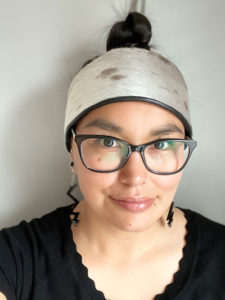Camosun College student Katie Manomie has been awarded the BC Lieutenant Governor’s Medal for Inclusion, Democracy, and Reconciliation.
The program was created in 1979 to recognize students who excel in their schoolwork and contribute to their institution or community.
Manomie, an Indigenous student who is in her second year of the Indigenous Family Support program, feels a strong sense of accountability for the award.
“I was quite shocked, to be honest, but I feel like it’s a huge responsibility,” she says. “It’s a big honour, and I think I was told that I was the first Indigenous woman to receive the medal, so it means a lot to me; it makes me quite emotional.”

Manomie is an Inuk woman born in Iqaluit, Nunavut. She was a part of the Sixties Scoop, which forcibly removed Indigenous children from their homes and communities to be assimilated into non-Indigenous culture. (Despite the name, the Scoop started in the ‘50s and lasted until 1991.)
“I was adopted at birth to a non-Indigenous woman and I was actually made to go to a Christian school, so I didn’t really learn about Indigenous heritage or my Inuit background at all, until I started at Camosun,” she says. “This is the most I’ve learned about Indigenous ways of living and knowing and being, and it finally feels right.”
Growing up, Manomie struggled in a culture which was prejudiced against Indigenous people, and her life took a turn for the worse. However, she was able to turn things around by searching for education that taught her more about her heritage.
“Racism was big, and I feel like there’s not much to do in small towns, so drinking and partying starts at a very young age, and that just kind of led into bad choices, and I did have a bout of homelessness, and that’s kind of why I didn’t finish high school,” says Manomie. “But then I went to the Native Education College in Vancouver about six years ago, and it just kind of went from there. But I honestly didn’t take things seriously until I started my sobriety journey.”
Manomie says that going back to her hometown and reconnecting with her community was very impactful, and when she was laid off due to COVID, it gave her the impetus to find a new path.
“I had the opportunity to fly back up north three years ago, to Iqaluit, Nunavut, and met my whole family, and that was very life-changing. I actually became clean and sober about two and a half years ago, and I wanted more out of my life,” she says. “I was in the hospitality industry for about 10 years, and it wasn’t fulfilling at all, and when COVID hit, I was actually let go from my supervisory position at a restaurant, and I thought, maybe this is the time to look back into school.”
Finding a connection with other people has been a great positive influence, says Manomie, and it has allowed her to feel a sense of belonging.
“I would say that community-based relationships is key in any type of learning, those relationships that you build with the old ones, or even just your classmates,” she says. “I think that’s been the most impactful part of this all, that I can relate to so many others when I didn’t really feel like I could relate to many people growing up.”
Manomie believes in the power of faith while travelling down the road of life, and she feels fortunate to be a part of the Camosun community.
“I feel that Creator has a path for all of us,” she says. “I’m really learning how to trust the process, and it’s not really in my hands. My path is set out for me now; I don’t think I’d be in this position if I wasn’t at Camosun.”
Correction: In this story, we originally said the Sixties Scoop ended in the late ’80s; it ended in 1991. We apologize for the mistake.
